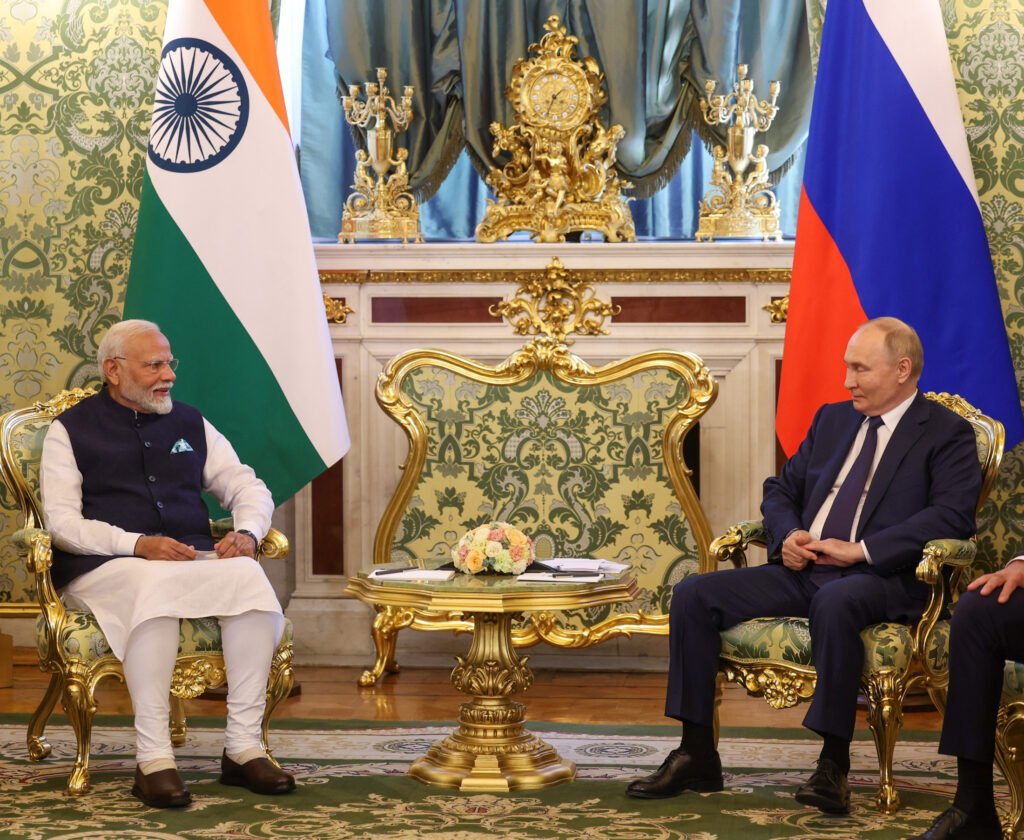
Prime Minister Narendra Modi’s recent visit to Russia on July 8-9, 2024, marked his first visit to the Kremlin since 2019. The timing of this two-day trip was particularly notable as it coincided with a NATO summit in Washington, where the ongoing 2022 invasion of Ukraine was a central theme. PM Modi’s arrival in Russia came just hours after a tragic bombing in Ukraine, which killed at least 41 people, including at a children’s hospital in Kyiv. Therefore, the timing of the visit was peculiar with the world watching over the unfolding of the visit.
During the visit, both countries discussed developing stable and efficient transport corridors, especially in Eurasia, including the Greater Eurasian space concept. They aim to expand logistics links, enhancing infrastructure for the Chennai-Vladivostok Corridor, the International North-South Transport Corridor (INSTC), and the Northern Sea Route. According to the MEA statement, joint efforts will intensify INSTC usage to reduce cargo transportation time and cost, promoting Eurasian connectivity. Cooperation will be transparent, participatory, financially sustainable, and respect national sovereignty. Additionally, both sides support Russia-India shipping via the Northern Sea Route, plan to establish a joint working body, and continue civil aviation and security cooperation.
Furthermore, they welcomed the 2024-2029 cooperation program for agriculture, energy, mining, manpower, diamonds mining and cutting, pharmaceuticals, and maritime transport. Both countries emphasized the need for interregional dialogue between the Russian Far East and Indian States, encouraging twinning relations for business, trade, educational, and cultural exchanges. Russia invites Indian investors to participate in high-tech projects in the Russian Far East. Both nations appreciated their respective participation in key economic forums and noted the India-Russia Business Dialogue’s role in promoting bilateral trade and investment.
During his two-day visit to Russia, coinciding with the Jagannath Yatra in Odisha, Prime Minister Narendra Modi, wearing an Odiya gamcha, addressed the Indian community in Moscow on the second day. He highlighted the successes of his government, the ambitious plans for his third term, and India’s growing global influence. Emphasizing the mutual trust and respect between India and Russia, Modi thanked President Putin for his enduring friendship. He reiterated India’s rapid progress, stating it is in his DNA to “challenge the challenges.” Modi underscored the significance of the number three in his third term goals, aiming for India to become the third-largest economy and create three crore houses for the poor. He highlighted India’s transformation with achievements such as hosting the G20, doubling airports, electrifying 40,000 kilometers of railways, and building the world’s tallest railway bridge. He credited the 140 crore citizens for these advancements calling them “Rashtradoot” (the nation’s envoys) and appreciated artists like Raj Kapoor for strengthening India-Russia ties. Modi commended Putin’s leadership, noting their strong personal and diplomatic bond.
Mr. Vinay Kwatra, the Foreign Secretary, clarified to the BBC that the visit was merely a scheduling priority, rejecting any symbolic political significance to its timing. This was also a unique visit as India balanced its relations with Russia and the West. In diplomacy, the choice of words matters, and PM Modi emphasized ‘peace and talks’ for resolving the Russia-Ukraine war. However, the West was quick to voice criticism, with Ukraine’s President Volodymyr Zelensky expressing strong disapproval. Zelensky predictably remarked, “It is a huge disappointment and a devastating blow to peace efforts to see the leader of the world’s largest democracy hug the world’s most bloody criminal in Moscow on such a day.” However, it is pertinent to mention that PM Modi was likely the only foreign leader who addressed the bombing of Kyiv’s children’s hospital whose origin is disputed since the Russian government has argued at the UN that it was a US-made Ukrainian missile that fell on the hospital.
Since March 2022, the Indian government has sent substantial humanitarian aid to Ukraine, totalling about 117 metric tons of supplies, including medicines, medical equipment, and other essentials. Additionally, India provided financial assistance for reconstructing and refurbishing a school in Kyiv and supported psychological health training for teachers. These efforts highlight India’s commitment to humanitarian aid and reconstruction in Ukraine, showcasing a balanced approach that extends beyond mere political statements. At the same time, PM Modi’s peace message to Russia was also a subtle communication to the West: any sustainable resolution to the Ukraine conflict must involve Moscow. This stance was also emphasised during the Ukraine Peace Summit earlier in June 2024, to which India participated but refrained from signing the joint declaration. This nuanced position reflects India’s strategic diplomacy, maintaining relations with Russia while advocating for peaceful resolutions.
It is also pertinent to note that in 2017, Chinese President Xi Jinping received Russia’s highest civilian award, the Order of St. Andrew the Apostle, underscoring the close ties between the two nations. Two years later, in 2019, President Vladimir Putin announced that Indian Prime Minister Narendra Modi would also be conferred the same prestigious award. However, the formal ceremony was held during the 22nd annual Russia-India bilateral summit. This timing was significant, as it highlighted Russia’s strategic diplomacy and the importance it places on its relationships with both China and India. By honouring PM Modi after President Xi, President Putin conveyed the message that both countries are crucial to Russia’s national strategy and that his government takes a balanced approach to the two Asian giants.






Add comment